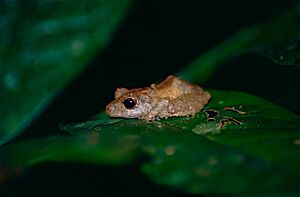New River robber frog facts for kids
Quick facts for kids New River robber frog |
|
|---|---|
 |
|
| Rain Frog (Pristimantis inguinalis) | |
| Conservation status | |
| Scientific classification |
|
| Kingdom: | Animalia |
| Phylum: | Chordata |
| Class: | Amphibia |
| Order: | Anura |
| Family: | Strabomantidae |
| Genus: | Pristimantis |
| Subgenus: | Pristimantis |
| Species: |
P. inguinalis
|
| Binomial name | |
| Pristimantis inguinalis (Parker, 1940)
|
|
| Script error: The function "autoWithCaption" does not exist. | |
| Synonyms | |
|
|
Script error: No such module "Check for conflicting parameters".
The New River robber frog (scientific name: Pristimantis inguinalis) is a type of frog. It belongs to the Strabomantidae family. You can find this frog in Guyana, Suriname, French Guiana, and northern Brazil. Specifically, it lives in the Amapá state of Brazil.
This frog was first discovered near the New River. This area is special because both Guyana and Suriname claim it. That's why the frog is also called the New River South American rain frog.
Contents
What Does the New River Robber Frog Look Like?
Adult male New River robber frogs are quite small. They are about 20.2 millimeters (which is less than an inch) long from their snout to their rear end.
Color and Markings
Frogs from French Guiana often have light brown backs. They have large, brownish-black patterns. One pattern behind their head looks like a "W" shape. Another pattern is shaped like a "chevron" (a V-shape). They also have black stripes above their mouths.
Their bellies are usually light gray. They have many tiny black dots. Some frogs might have a black belly. A bright yellowish-orange spot can be seen in their groin area. Their eyes, or irises, are gray to reddish. They have thin, wiggly black lines in them.
Frogs from Kaieteur National Park in Guyana can have different colors. Their backs might be greenish-brown, brown, or dark brown. Some even have a stripe along their sides. The spots on their bellies can be dark brown or white. The top part of their iris might be gold, while the bottom is reddish-gray.
Frog Calls
Male frogs make a special sound to attract mates. This sound is a single note, about 3 kilohertz high. They make this sound every 3 to 5 seconds.
Where Do New River Robber Frogs Live?
The New River robber frog lives in thick, untouched forests. These are called primary forests. They live at heights from 50 to 700 meters (about 164 to 2,300 feet) above sea level.
Habitat and Habits
These frogs are arboreal. This means they spend most of their lives in trees. They lay their eggs under moss on tree trunks. These eggs are usually placed about 3 to 5 meters (10 to 16 feet) above the ground. Male frogs also call out from trees. They are often found 4 to 6 meters (13 to 20 feet) up.
Conservation Status
The New River robber frog is a common species. Scientists do not know of any major threats to these frogs. Their homes are safe because they live in several protected areas.
 | Mary Eliza Mahoney |
 | Susie King Taylor |
 | Ida Gray |
 | Eliza Ann Grier |


